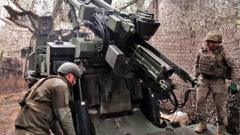In the midst of relentless conflict in eastern Ukraine, soldiers express hope for peace as diplomatic talks with Russia resume. Despite the devastation and personal losses, the desire to end the war remains strong among those defending their homeland.
Hope and Despair: Ukrainian Soldiers on the Front Lines Eye Talks with Russia

Hope and Despair: Ukrainian Soldiers on the Front Lines Eye Talks with Russia
Front-line soldiers in Ukraine express cautious optimism about renewed peace talks with Russia amid ongoing devastation and personal losses.
Big clouds of smoke loom over the battlefield, captured vividly by drones patrolling the skies above Pokrovsk, where Ukrainian forces confront Russian troops. In a rural command center located just miles from the front lines, the Ukrainian army’s 155th mechanized brigade monitors the devastation. With the conflict intensifying, hopes for a ceasefire are cautiously rekindled as diplomatic channels between Ukraine and Russia open after years of impasse.
"My faith lies in the fact that Russia initiated these talks," remarks a soldier known by his call sign, Kozak. "I hope this signifies the beginning of the end of the war." Despite the optimism, many remain skeptical, having seen fleeting hopes dashed in the past. They witness firsthand the reduced capabilities of their adversaries, suggesting a shift in momentum in the fight for Pokrovsk - a vital transportation route in Donetsk.
Yurii, a former tech worker turned soldier, shares that both sides must engage in dialogue, though he maintains that the responsibility for the conflict does not lie with Ukraine. "We long for peace, yet we cannot forget that we did not spark this war," he emphasizes. As the unit prepares for battle, the landscape is riddled with risk, as drones increasingly pose new dangers by dropping advanced munitions.
As artillery strikes resound, more than ever, soldiers voice a need for increased supplies and resources from their international allies. The French-made self-propelled artillery, the "Caesar," has become a crucial ally in combat due to its speed and precision, a welcome upgrade from outdated Soviet equipment.
Yet, the topic of concessions looms heavily within the unit. Both Kozak and Yurii contend that giving up territory would not lead to peace but rather invite further aggression from Russia. "A person who hasn't been here will never understand the agony of our losses," Kozak asserts.
Further complicating matters are the emotional toll and the stark reminders of what the war has cost. Amid the landscape of ash and rubble, families mourn fallen soldiers. Yana Melnikova, who lost her son Vladislav to the ongoing conflict, clings to hopes of a peaceful resolution. Despite participating in the memorial for her son, she feels despair that peace talks may not change the nature of the aggression they face.
As the fighting continues and talks begin, the struggle for Ukraine remains fraught with uncertainty. While the hope for peace resonates among soldiers and families alike, the haunting realities of war linger, leaving many to question if genuine change is possible in the face of relentless aggression.























